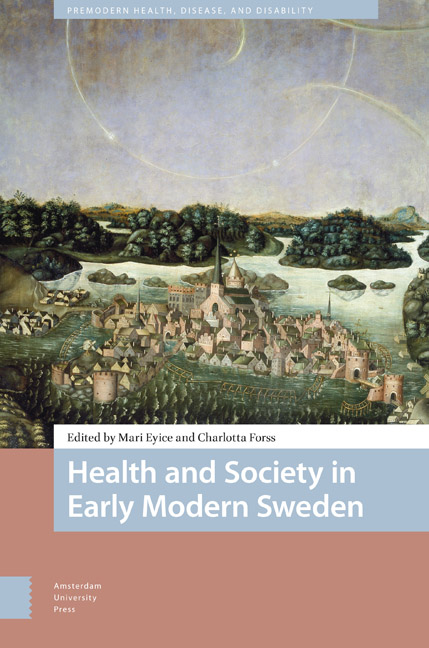Book contents
- Frontmatter
- Contents
- List of Tables and Figures
- Acknowledgements
- 1 Meanings of Health in Early Modern Sweden
- 2 Illness as Incapacity to Work in Early Modern Sweden
- 3 The Body in the Bathhouse: Health and Bathing in Early Modern Sweden
- 4 ‘Somewhat Heated, Quick and Lively’ : Humoral Explanations of the Learning Difficulties of Charles XI of Sweden (1655–1697)
- 5 Health in Body and Soul in a Female Birgittine Convent 1516–1522
- 6 Curing Madness and Mental Disturbances : Religious Healing Activities in Early Modern Swedish Local Communities
- 7 Not Quacks but Close : Reappraising the Role of Physicians on the Eighteenth-Century Medical Market
- 8 Gender, Health, and Hair in Sweden, 1740–1840
- 9 Gender Norms and Early Modern Healthcare : Barber-Surgeons in Sweden c. 1600–1900
- Epilogue : Epistemologies of Body and Soul: Considering the Early Modern and (Late) Modern History of Health
- Index
1 - Meanings of Health in Early Modern Sweden
Published online by Cambridge University Press: 16 April 2024
- Frontmatter
- Contents
- List of Tables and Figures
- Acknowledgements
- 1 Meanings of Health in Early Modern Sweden
- 2 Illness as Incapacity to Work in Early Modern Sweden
- 3 The Body in the Bathhouse: Health and Bathing in Early Modern Sweden
- 4 ‘Somewhat Heated, Quick and Lively’ : Humoral Explanations of the Learning Difficulties of Charles XI of Sweden (1655–1697)
- 5 Health in Body and Soul in a Female Birgittine Convent 1516–1522
- 6 Curing Madness and Mental Disturbances : Religious Healing Activities in Early Modern Swedish Local Communities
- 7 Not Quacks but Close : Reappraising the Role of Physicians on the Eighteenth-Century Medical Market
- 8 Gender, Health, and Hair in Sweden, 1740–1840
- 9 Gender Norms and Early Modern Healthcare : Barber-Surgeons in Sweden c. 1600–1900
- Epilogue : Epistemologies of Body and Soul: Considering the Early Modern and (Late) Modern History of Health
- Index
Summary
Abstract
This introduction outlines a conceptual framework for analysing the historically situated nature of ‘health.’ While previous historical research has elucidated conceptions of illness as changeable over time, it is our contention that the meaning of health is often taken for granted. We examine the semantic field of ‘health’ (Swe. hälsa) and associated terms as they were used in early modern Sweden, showing health as a multifaceted concept with connotations to bodily and mental well-being, prosperity, politics, and religion alike. The individual chapters of the volume are situated in the broader account of early modern medicine, which highlights how a focus on a contextual understanding of health can inform the history of medicine and the broader account of early modern history.
Keywords: health, early modern history, social history of medicine, conceptual history
Introduction
In a poem entitled ‘Halse-Prijs’ (Eng. ‘In praise of health’), the Swedish seventeenth-century poet, scholar, and civil servant Georg Stiernhielm concluded that ‘all is nothing, where health is not.’ To Stiernhielm, money, power, and worldly honours were all useless if he was not healthy. He explained that the person who is favoured with health ‘lives happy in daily joy, without sorrows,’ until the day he falls ill, and then all good fortune is lost. To Stiernhielm's early modern reader, the poem ‘Halse-Prijs’ would have been recognisable as a reference to the literary theme that fortune is fickle: it is well to remember that riches can vanish quickly. To the modern reader, the poem appears to express familiar present-day sentiments regarding how highly we value good health. Yet this is also a poem that raises questions.
Stiernhielm was born in Dalecarlia in central Sweden in 1598, and he died in Stockholm in 1672. He lived in a time and a society without antiseptic surgery, extensive healthcare, welfare institutions, or modern notions of cleanliness, for that matter. In light of this, we cannot assume that ‘health’ was understood the same way to Stiernhielm as it is conceptualised today. What did Stiernhielm actually praise in his poem? When was a person considered healthy in early modern society, and when were they deemed ill?
- Type
- Chapter
- Information
- Health and Society in Early Modern Sweden , pp. 11 - 36Publisher: Amsterdam University PressPrint publication year: 2024



